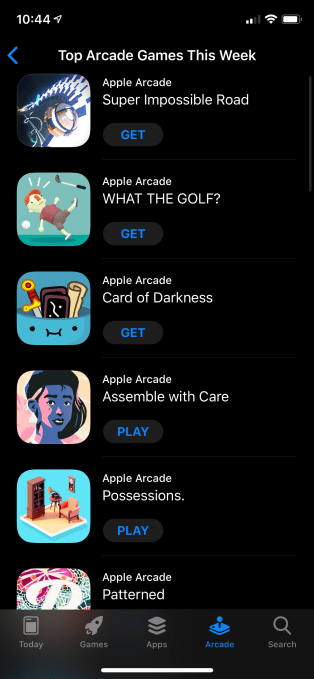Welcome back to This Week in Apps, the Extra Crunch series that recaps the latest OS news, the applications they support and the money that flows through it all. What are developers talking about? What do app publishers and marketers need to know? How are politics impacting the App Store and app businesses? And which apps are everyone using?
This week, we’re discussing the impact of the CFIUS investigation into TikTok, the further fallout of Apple’s vaping app ban, updates to Apple Arcade and Google Play Pass subscription-based app stores, Apple’s breaking changes that rolled out without warning (thanks, Apple!) and a shady app that reached the top of the App Store thanks to a big Kardashians-led endorsement, among other things.
Headlines
TikTok separates further from its Chinese parent
One of the world’s most downloaded and used apps, TikTok, is under a national security review in the U.S. because of its Chinese roots. TikTok parent company, ByteDance, is a China-based operation — something that has raised concerns because of its significant access to U.S. users’ personal data and potential censorship issues.
The company was already working to separate itself further from China before the Committee on Foreign Investment in the United States (CFIUS) began its investigation. For example, it separated the TikTok product, business development, marketing and legal teams from those of its Chinese app, Douyin, and hired consultants to audit how it’s storing U.S. users’ personal data. Following the investigation, it hired more U.S. engineers and set up a U.S.-based team to oversee data management, Reuters reported.
The question now is whether not these moves — along with a promise to not store U.S. user data in China — will be enough. The app collects data including profile information such as name, age, email and phone number, provided by users, as well as photos, videos, and location. Many of TikTok users are younger teens and college students.
Even if you’re “too old” to care about TikTok, CFIUS investigation’s conclusions here will have a larger impact on the global app industry, as they’ll set precedents as to how foreign powers can compete in U.S. app stores.
Oops: Apple releases breaking changes with no warning
Apple this week introduced new server-to-server notifications for subscriptions that allowed developers to receive real-time updates in a subscription’s status, so they could provide customized experiences for subscribers. Only one problem with the release: Apple broke most server notifications implementations as a result. Developers weren’t given any warning about the APIs that were “scheduled for deprecation,” either, which is not typically how web APIs are managed. To add icing to the cake, not only were the changes released without warning, they were also rolled out on a Friday — there goes the weekend. Thanks, Apple.
They mentioned it in their new docs. Apparently “scheduled for deprecation” meant today.
This is not how you manage web APIs. When Google deprecates an API they give months of warning, automated emails, and repeated communications.
Apple just changes shit. pic.twitter.com/QG4PyLxNVK
— Jacob Eiting (@jeiting) November 22, 2019
The vaping app ban backlash continues
Has Apple crossed the line between protecting its users from dangerous apps to just turning into an overbearing parent policing adults’ ability to make their own choices? Over the past couple of weeks, several have said the latter. Now concerning are arising about what this means for the overall industry and whether or not decisions like this should even be in Apple’s hands in the first place.
As you may recall, Apple earlier made a controversial decision to remove all 181 vaping-related apps from its App Store in wake of news from the CDC about the 47 vaping deaths and thousands of lung injuries. Some early studies point to Vitamin E acetate, an addictive used in THC oil, as the cause. But Apple isn’t worrying about the details of what’s dangerous and what’s not — it just wiped out anything vaping-related, including things like Bluetooth-connected apps that let users control aspects of their vaping devices, like the lights, heat, and updates to the firmware. There’s no backup plan here for those app makers, since web apps don’t offer the same level of functionality. Plus, the ban is also impacting devices used to distribute medication as well as apps designed to help people cut down and eventually quit smoking and vaping by tracking their nicotine usage.
For app entrepreneurs, Apple’s decision in one fell swoop also just destroyed half the vaping app market as their apps will now only run on Android.
The question now is whether or not any of this should be Apple’s decision? While you may personally applaud a vaping app ban — or simply not care because it doesn’t affect you — Apple has made other controversial choices that have a more serious impact. Like when it kicked out the app that aided Hong Kong protestors, for example.
Apple Arcade and Google Play Pass expand their collections
Apple’s subscription-based gaming store and Google’s rival subscription app store, Google Play Pass, have both added new apps since their debuts. Now, the two companies are making users aware of their ongoing efforts to beef up their respective collections. Apple this week shared a video that highlighted over a dozen new Apple Arcade releases that hit this month — the first time it’s released a compilation video featuring multiple titles since its launch.
Meanwhile, Google Play Pass added 37 more apps to bring its total to 274.
What we don’t know yet, is how well the two services are working — or whether they will benefit developers in the long run. And because neither has a Top Charts section, it’s not even clear what apps are most popular or how many downloads they’re seeing.
Apple Arcade adds a “Top Games” chart… well, sorta… OK, not really
 Apple took a step to address the above problem with a new section in Apple Arcade called “Top Arcade Games This Week.” We had argued earlier that the lack of visibility into the popularity of titles on Arcade was a disservice to users who wanted quickly and easily find the most popular titles.
Apple took a step to address the above problem with a new section in Apple Arcade called “Top Arcade Games This Week.” We had argued earlier that the lack of visibility into the popularity of titles on Arcade was a disservice to users who wanted quickly and easily find the most popular titles.
But this new section, while fun, doesn’t solve the problem. Top Games, based on what? Downloads? Editorial curation? Both? Is there going to be an API for it?
It’s common knowledge that the App Store’s Top Charts are based on a combination of downloads and velocity. And that data is accessible to third parties like App Annie, Sensor Tower, Apptopia and others who use it to come up with download estimates.
But a “Top Games This Week” section is not the same thing as a real Top Charts section. And by limiting it to only a week’s time, it provides no real insight into whether or not the Arcade is able to produce a lasting hit the way the App Store can, or what those hit titles may be.
Apple has distanced itself from promoting the Top Charts as a means of app discovery for years now. With its big App Store makeover, it shifted its focus more to editorial, curation, and recommendations, rather than downloads. But for a smaller store like Arcade, Top Charts could have value as they would feature some of the best titles from an already exclusive collection — that’s something people would want to see.


